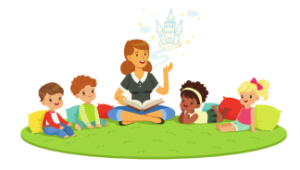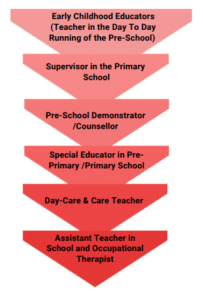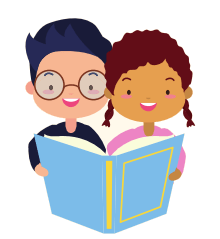A Career in Early Childhood Education
Early childhood education describes the period of learning that takes place from birth to 8 years. It is a time of remarkable growth with brain development at its peak. During this stage, children are highly influenced by the environment and the people that surround them. It is therefore an important time for the children because it is during this time that children first learn how to interact with others, including peers, teachers and parents, and also begin to develop interests that will stay with them throughout their lives. It’s a time when children learn critical social and emotional skills.
 Early childhood education is more than preparation for primary school. It aims at the holistic development of a child’s social, emotional, cognitive and physical needs in order to build a solid and broad foundation for lifelong learning and well-being. Early childhood programs include various types of educational programs that serve children in the preschool years and are designed to improve later school performance. They are also known by a variety of names, including nursery, preschool and pre-kindergarten.
Early childhood education is more than preparation for primary school. It aims at the holistic development of a child’s social, emotional, cognitive and physical needs in order to build a solid and broad foundation for lifelong learning and well-being. Early childhood programs include various types of educational programs that serve children in the preschool years and are designed to improve later school performance. They are also known by a variety of names, including nursery, preschool and pre-kindergarten.
Early childhood education can produce significant gains in children’s learning and development. High quality early childhood education assists many at-risk children in avoiding poor outcomes, such as dropping out of school. Although the benefits seem to cross all economic and social lines, the most significant gains are almost always noted among children from families with the lowest income levels and the least amount of formal education. Other long-term benefits include decrease in crime by children and increased attendance in schools leading to secondary and senior secondary school graduation.
The goals of an early childhood education program can be split into four main development themes:
- Social Development
An early childhood education program strives to support a child’s understanding of himself or herself as individuals who live in relationship to others. In addition to delivering what many parents consider foundational skills like sharing, using respectful language like, “please” and “thank you,” and contributing to shared efforts like cleaning up and following directions, early childhood education programs also focus on instilling the attitudes and values of equality, peace, and collaboration in children. %27%20fill-opacity%3D%27.5%27%3E%3Cellipse%20fill%3D%22%23974224%22%20fill-opacity%3D%22.5%22%20rx%3D%221%22%20ry%3D%221%22%20transform%3D%22matrix(74.46737%2019.94972%20-10.87683%2040.60052%20110.6%2062.8)%22%2F%3E%3Cellipse%20fill%3D%22%23c9fcff%22%20fill-opacity%3D%22.5%22%20rx%3D%221%22%20ry%3D%221%22%20transform%3D%22matrix(-8.46953%20-54.08527%20216.3632%20-33.88157%20152.8%20196.8)%22%2F%3E%3Cellipse%20fill%3D%22%23fff%22%20fill-opacity%3D%22.5%22%20rx%3D%221%22%20ry%3D%221%22%20transform%3D%22matrix(-27.30311%20-2.30367%2016.93651%20-200.73162%20204.9%20132.2)%22%2F%3E%3Cellipse%20fill%3D%22%2369b7dc%22%20fill-opacity%3D%22.5%22%20rx%3D%221%22%20ry%3D%221%22%20transform%3D%22matrix(-60.21381%20-13.45938%209.48792%20-42.4465%20100%20181.4)%22%2F%3E%3C%2Fg%3E%3C%2Fsvg%3E) Emotional Development
Emotional Development
In the early years, children develop essential emotional skills like self-confidence, self-regulation of their emotions, selfexpression, self-respect, and positive self-belief. These skills are essential for later activities like problem-solving and healthy risktaking. Small class sizes and lots of teacher interaction time help children learn these skills in an environment in which they are known, cared for, and encouraged to practice these skills. By establishing a strong emotional foundation where children understand their value as friends, learners, and individuals, and where they have confidence in themselves and their ability to express their ideas, emotions, and needs, children are prepared for increasingly complex social-emotional and academic challenges.- Physical Development
An early childhood education program overlaps with a child’s development of gross and fine motor skills, physical coordination (handeye coordination, biking, running, etc.), and their understanding of healthy skills like hand-washing, regular exercise, and balanced eating. An early childhood education program develops these skills through free and planned play, engaging activities like sensory tables, building, painting, playing instruments, etc., and coordinated games where children practice running, pulling, pushing, hopping, and working together while having fun! - Intellectual and Academic
Development While an early childhood education program should have carefully researched goals for literacy and numeracy, the foundations of academic success are only one part of a child’s intellectual development during the early years. It is essential that a child sees himself or herself as a capable learner, who can grapple with new topics that may seem tricky at first, and resist giving up when a topic or task becomes difficult. Here, a child’s intellectual development extends far beyond the classroom. Early years programs that promote a strong intellectual curiosity and lead children to a life of observing, wondering, questioning, and discovery allow the classroom environment to engage with and incorporate a child’s interests into the learning journey.
An early childhood educator thus is a qualified professional who educates children from the age of 3 years until they begin formal schooling. They address the cognitive, social, emotional and physical needs of both the individual child and groups of children.
The Early Childhood Educators are responsible for:

- Developing and implementing child-care programs that support and promote the physical, cognitive, emotional and social development of children.
- Leading activities by telling or reading stories, teaching songs, taking children to local points of interest and providing opportunities to express creativity through the media of art, dramatic play, music and physical activity.
- Planning and maintaining an environment that protects the health, security and well-being of children.
- Assessing the abilities, interests and needs of children and discuss progress or problems with parents and other staff members.
- Observing children for signs of potential learning or behavioural problems and prepare reports for parents, guardians or supervisor.
- Guiding and assisting children in the development of proper eating, dressing and toilet habits.
- Establishing and maintaining collaborative relationships with co-workers and community service providers working with children.
- Supervising and co-ordinate activities of other early childhood educators and early childhood educator assistants.
| Education Pathway | ||
|---|---|---|
| After 12th/Undergraduate | Some Colleges | |
|
Diploma in Early Child Care and Education Diploma in Early Childhood Education Primary Teacher Training Bachelor of Elementary Education |
| |


 Emotional Development
Emotional Development
